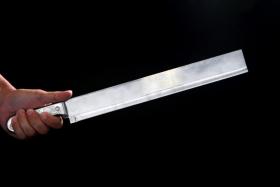Worker who rejected compensation ordered to pay $35,000 after losing court case
An injured worker was offered compensation under the Work Injury Compensation Act (Wica) but declined the sum and opted to sue in court instead.
He failed to prove his claim and now finds he must pay $35,000 in costs.
The case could serve as an eye-opener for workers who spurn the compensation that the Ministry of Manpower (MOM) offers them.
The ministry has asked such workers to "consider carefully" before they opt to go to court as the burden of proof there may be different.
The issue has come under the spotlight following the case of Chinese national Xu Zhenbing, who claimed that he suffered injuries on his right wrist when carrying out reinforcement works of metal rebars in a lift shaft at an Alexandra View worksite in 2014. He was 43 years old at the time.
Defendants Sen Lin Construction and Daewoo Engineering & Construction, represented by lawyer Hong Heng Leong, contested his claims in the High Court trial.
Judicial Commissioner Audrey Lim ruled last month that Mr Xu was not able to show, on balance, that "he was performing metal rebar works at a lift shaft on Sept 27, 2014".
The records did not indicate rebar works done at the lift shaft and it was "more likely" that he was doing rebar works at the water pipes as documented, the judge said.
Mr Xu had claimed that he told a senior company employee about the accident at around 9pm on the same day at the workers' dormitory.
But the employee testified that he did not make such trips down to the dormitory, "much less on a weekend and so late at night".
Judicial Commissioner Lim also found it strange that the worker told the doctor in January 2015 that the fracture occurred only about two months after he had hurt himself.
"Xu's claim on how he sustained the injury rested essentially on his own oral assertions," added the judge. She also made it clear that MOM's findings on the case did not affect her findings as there was no evidence on how rigorous the assessment was.
Mr Xu, represented by lawyer Eric Liew, was ordered to pay $35,000 in legal costs.
Ms Kee Ee Wah, director of MOM's Work Injury Compensation Department, said that Wica was a no-fault regime that admitted claims as long as the injury arose in the course of employment.
"The worker need not prove fault or negligence on anyone's part," she said.
In Mr Xu's case, none of the four witnesses produced by the employer could show that the injury was not work-related and the claim was admitted.
Noting that about 800 injured workers annually withdraw their Wica claims to pursue them in court instead, Ms Kee urged injured workers to "consider carefully between claiming under Wica and filing a suit under common law, as the evidential requirements are different".
Workers can still re-apply for Wica claims within a year of the accident after losing their lawsuit, but in Mr Xu's case, that deadline has already passed.
According to MOM's website, for accidents before Jan 1 last year, involving permanent incapacity, the compensation payable varies between $73,000 and $218,000.
Get The New Paper on your phone with the free TNP app. Download from the Apple App Store or Google Play Store now



